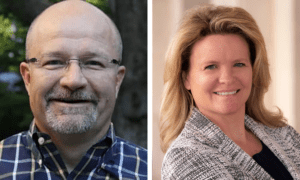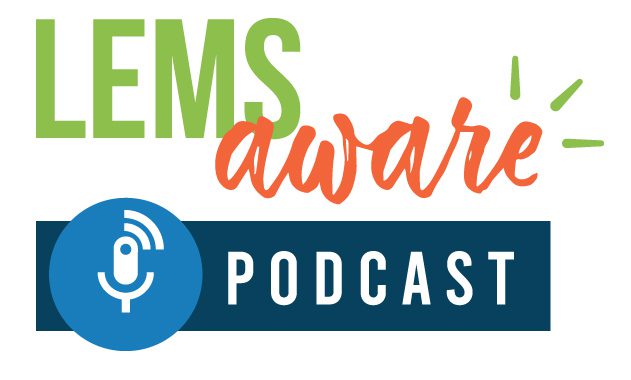Acknowledgment: This story is sponsored by Catalyst Pharmaceuticals, Inc., and is promoted through the Patient Worthy Collaborative Content program. We only publish content that embodies our mission of providing relevant, vetted, and valuable information to the rare disease community.
Catalyst Pharmaceuticals, Inc., is making it their mission to help support the Lambert-Eaton myasthenic syndrome (LEMS) patient community and spread awareness. As part of these efforts, the company has recently kicked off the LEMS Aware podcast. In recent years, podcasting has exploded as a popular form of media, both for entertainment and education.
Patient Worthy recently sat down with podcast host Kevin Freiert and Amy Grover, Senior Director of Patient Advocacy at Catalyst Pharmaceuticals, in order to learn more about the LEMS Aware podcast.
Can you give us an overview of the podcast for anyone who has not yet listened to it?
Amy: Well, it’s difficult to connect patients — especially in the space of ultra-rare disease. There’s only about 3,000 LEMS patients in the United States that we know of. LEMS is primarily an adult onset rare disease and most patients are between 50 and 70 years old. Podcasts are just a different medium to have patients connect with other patients. Patient stories are great, but to listen to a conversation can help connect patients in a way they haven’t before.
Kevin: We’re talking to patients from the LEMS community so that they know of one another. And we have conversations that allow them to be very intimate with each other, because podcasts are surprisingly good at creating intimacy. You feel like you’re there, like you know these people.
Amy: So far, it’s been resonating with the patient community. I’m looking forward to seeing where it goes. We’re just starting with patient stories, possibly some panels, but I think we can do some great things with it.

Can you tell us more about your backgrounds and how the podcast got started?
Amy: I worked with the LEMS community at Global Genes and now at Catalyst. We make a great effort to support the LEMS community and the podcast is a big part of that. We want to be all-inclusive and we are looking at different ways to do that because people take in information differently. Jaymie, our Senior Manager of Social Media and Digital Marketing, suggested that we start a podcast. I had been doing podcasts myself, and one of them was with Kevin, so we thought that was a great idea.
Kevin: I started at Pfizer in 1987 and spent 30 years there in many different roles. My career was made by interacting with people. As I was retiring, we had a meeting with patients and one of them absolutely nailed us to the wall with critiques. Later, I started a company called Salem Oaks, which helps to educate patients, keeping some of the critiques from that meeting in mind. A little bit of a left hand turn for our efforts was was to try a podcast. This was the podcast that Amy was on. We wanted to put a human face on the science and scientists of disease research. In the meantime I had also started a podcast called Raising Rare, which has done well. We are up to our 50th episode already!
What guests have you had on the LEMS Aware Podcast and what topics have been discussed?
Amy: The first topic was, “How did a LEMS diagnosis change your path?” We had two community leaders who really found new purpose through their diagnosis by giving back and being involved. We brought on a caregiver for the second episode. We wanted to include that perspective on how he felt about the diagnostic journey of his wife. I love this one because he is such a huge source of support for his wife, but he also talked about some of the mistakes he made along the way. It was a very raw and open conversation. The latest episode is about having a positive outlook in the face of a LEMS diagnosis.
Kevin: The first two guests were Price and Ashley. Ashley is in her 30s and Price is in his 70s. He was late onset and she was early onset. Their perspectives were fascinating, and they’re very good friends now. The next one, the caregiver Anthony, he’s a working guy from Staten Island, and he sounds like one. He’s just this loving guy who feels bad because he didn’t notice how much his wife was declining after her diagnosis. His story as a caregiver, it’s amazing because he’s picked himself up and he’s adopted a mindset that helps him and his wife get through their daily challenges. Peter was our most recent guest. He was in the special forces, and spent some time in the corporate world. When he was diagnosed with LEMS, he worked the problem and pushed forward. He’s adapted and is living a very full life.
Some of the places we want to go include tackling some of the tough questions that people don’t really talk about. What do you do about work? What about your sex life? We want to talk to people who have found solutions. One of the big objectives with the podcast is helping the community come together and get more organized and active. First we have to get enough of them together and speaking about their experiences so that people don’t feel so isolated.

Do you think there’s information in the LEMS Aware Podcast that is relevant to the broader rare disease community?
Kevin: Absolutely. I think people that are listening in who have a rare disease that isn’t LEMS could definitely appreciate it. What these patients are saying about their experiences, I think, resonates across the rare disease community. Feeling like you’re unable to explain to people what you are going through is a commonly reported experience.
Amy: Right! Feeling isolated even among your family, is huge. I worked at Global Genes for 10 years and it was a very caregiver-driven environment that focused on pediatric disease. But LEMS patients are often approaching retirement age, following a trajectory they had planned out for decades that is not quite going how they imagined. There isn’t enough love given to adult-onset conditions, especially invisible diseases. Giving voice to these people is what we’re trying to do, and that’s something that is valuable even if you don’t have a LEMS diagnosis.
Kevin: On my other podcast, Raising Rare, we follow two families and their daily experiences. Their friends and coworkers listen to it and it helps them to know what’s going on. We hope that this podcast can help do that for LEMS patients, so they don’t get stuck having to explain everything to their friends and family all of the time, which can be exhausting.
Amy: And often patients just don’t know how to articulate what’s going on with friends and family. This podcast can get that awareness out there, so that things are just a little bit easier.
To listen to the podcast and learn more about LEMS, visit LEMSAware.com.
About LEMS
Lambert-Eaton myasthenic syndrome (LEMS) is a rare neuromuscular disease that affects the signals sent from the nerves to the muscles.
LEMS typically causes severe, debilitating, and progressive weakness in the upper legs and hips, making it difficult for a person to walk or even stand. LEMS can also weaken the muscles of the upper arms and shoulders, making self-care and independence difficult.
About 50% of LEMS cases are associated with an underlying tumor – often small-cell lung cancer (SCLC).
Learn more about Lambert-Eaton myasthenic syndrome at LEMSAware.com.






